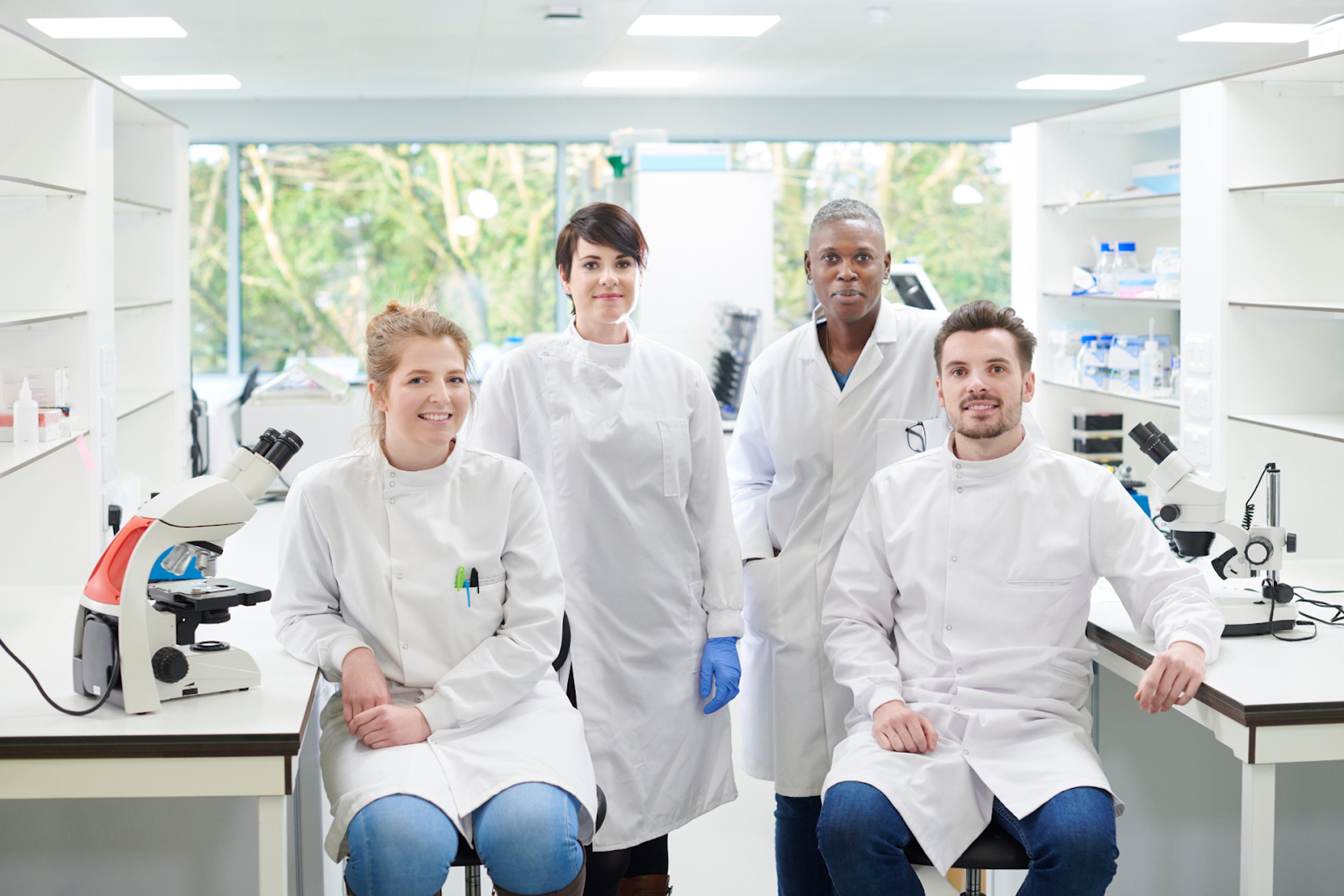How to Become a Physician Assistant
Learn how to create a competitive application for physician assistant programs, including tips on academic history, personal statements, letters of recommendation, direct patient care experience, and GRE preparation. Stand out with a polished, well-rounded application.
Posted March 6, 2025

Table of Contents
Physician Assistants (PAs) are key contributors to the healthcare industry, providing essential medical services that support patients' well-being. They perform physical exams, diagnose and treat illnesses, prescribe medication, and assist in surgical procedures. Physician assistants work in various medical settings, including hospitals, outpatient clinics, nursing homes, and private medical offices.
The career path to becoming a physician assistant is well-structured but rigorous. It requires a combination of formal education, hands-on healthcare experience, and a commitment to maintaining certification throughout your career. The demand for PAs is rising, driven by their ability to practice medicine in collaboration with physicians and their adaptability across specialties like internal medicine, family medicine, and emergency medicine.
This guide will walk you through how to become a physician assistant, covering every step, from meeting educational prerequisites to preparing for certification exams and building a rewarding career.
What is a Physician Assistant?
A Physician Assistant is a healthcare professional who works as part of a team with a physician. PAs are licensed to practice medicine and to perform procedures delegated by the supervising physician. They work in various settings, including hospitals, clinics, and private practices, and provide care to patients of all ages and backgrounds. As a PA, you will be able to diagnose and treat illnesses, order and interpret tests, prescribe medications, and assist with surgeries. You will also educate patients on disease prevention and management, and collaborate with other healthcare professionals to provide comprehensive care.
The Role of a Physician Assistant in Healthcare
A physician assistant is a licensed medical professional who practices medicine under the supervision of a physician. They are vital members of the healthcare team, working closely with doctors, nurses, and other healthcare providers to deliver quality care.
What Does a Physician Assistant Do?
- Performing physical exams – PAs assess patients’ medical histories, conduct diagnostic tests, and evaluate symptoms to diagnose conditions.
- Developing and implementing treatment plans – They create comprehensive treatment strategies tailored to individual patient needs.
- Prescribing medication – In most states, physician assistants can prescribe medicine, contributing to efficient patient care.
- Assisting in surgical procedures – PAs often support surgeons during operations by providing surgical knowledge and technical assistance.
- Providing preventative care – They educate patients on health maintenance, nutrition, and lifestyle changes to prevent illnesses.
PAs work in diverse clinical settings, including:
- Hospitals: Treating patients in emergency medicine, internal medicine, and specialized units.
- Outpatient Clinics: Providing routine and preventative care for individuals and families.
- Nursing Homes: Offering care for elderly patients, focusing on chronic condition management and quality of life.
- Private Practices and Medical Offices: Supporting physicians in treating a wide range of conditions.
PA vs. Nurse Practitioner vs. Physician
| Category | Physician Assistant (PA) | Nurse Practitioner (NP) | Physician |
|---|---|---|---|
| Training Model | The medical model focused on general medicine | Nursing model, often specializing in areas like family medicine | The medical model with in-depth specialization through medical school and residency |
| Scope of Practice | Specialty-focused; practice often tied to a specific area of expertise | Specialty-focused; practice often tied to a specific area of expertise | Broadest scope of practice with advanced specialization |
| Education | Master's degree; typically 2-3 years of PA school | Master's or Doctorate in Nursing; 2-4 years of training | Medical school (4 years) + residency (3-7 years, depending on specialty) |
| Independence | Practices under a supervising physician (varies by state) | May practice independently in many states | Fully independent practice |
| Specialty Flexibility | High; able to move between specialties without formal retraining | Moderate; specialization often limits flexibility | Low; retraining required to switch specialties |
Why Choose the PA Career Path?
- Versatility: PAs can transition between specialties without pursuing new degrees or certifications, making them flexible in the healthcare field.
- Competitive Salaries: Labor statistics report median salaries for physician assistants exceeding $120,000 annually in many states.
- Work-Life Balance: The structured work hours often provide better work-life balance compared to physicians.
- Job Outlook: The healthcare industry’s growing demand for PAs, particularly in underserved areas, ensures strong job security.
How Much Do Physician Assistants Earn in the U.S.?
According to the United States Bureau of Labor Statistics, the median salary for a physician assistant in 2023 is $130,020.
Top-Paying Physician Assistant Specialties
The following specialties offer the highest salaries for physician assistants, providing valuable insight for career planning. Salaries vary significantly depending on geographic location, experience level, and employment setting (e.g., hospital vs. private practice):
| Specialty | Average Annual Salary ($) |
|---|---|
| Emergency Medicine PA | 187,405 |
| Hematology Oncology PA | 183,962 |
| Cardiology PA | 180,001 |
| Orthopedic Surgery PA | 178,546 |
| Occupational Medicine PA | 173,975 |
| Neurosurgery PA | 172,042 |
| Rheumatology PA | 156,966 |
| Critical Care PA | 156,264 |
| Cardiothoracic Surgery PA | 156,057 |
| Urology PA | 155,445 |
| Pediatric PA | 148,456 |
| Acute Care/Trauma Surgery PA | 143,629 |
| Radiology PA | 133,670 |
| Urgent Care PA | 131,746 |
| Dermatology PA | 128,951 |
| Gastroenterology PA | 128,847 |
| Psychiatric PA-Certified | 128,673 |
| OB-GYN/Gynecologist PA | 120,212 |
| Plastic Surgery PA | 118,539 |
| ENT/Otolaryngologist PA | 116,182 |
Read: Physician Assistant Salary by Specialty: Which PA Specialties Pay the Most?
Timeline to Becoming a Physician Assistant
Becoming a physician assistant typically takes 6–8 years of education and training, depending on your starting point and pace. Understanding this timeline helps prospective PAs plan their academic and professional journey effectively.
| Steps | Description |
|---|---|
| Step 1: Undergraduate Education (4 Years) | Earn a Bachelor’s Degree: Most PA programs require a bachelor’s degree in biological or health sciences. Complete Prerequisite Courses: Anatomy and Physiology, General and Organic Chemistry, Microbiology, Statistics or Biostatistics, Psychology. Maintain a Competitive GPA: Minimum GPA of 3.0, but competitive applicants typically have 3.5 or higher. |
| Step 2: Gain Direct Patient Care Experience (1–2 Years) | Why It’s Important: 500–2,000 hours of direct patient care experience is required by most PA programs. Common Roles: Emergency Medical Technician (EMT), Certified Nursing Assistant (CNA), Medical Assistant, Phlebotomist, Clinical Research Coordinator. |
| Step 3: Apply to Physician Assistant Programs (1 Year) | Application Process: Apply via CASPA, and submit academic transcripts, experience, and personal statement. Prepare for the GRE if needed. Key Components: Strong letters of recommendation and a compelling personal statement. |
| Step 4: Complete a Physician Assistant Program (2–3 Years) | PA School: Master's degree programs accredited by ARC-PA. Includes classroom learning and clinical rotations. Clinical Rotations: Hands-on experience in various settings like emergency medicine, primary care, internal medicine, and specialties such as cardiology and pediatrics. |
| Step 5: Pass the Physician Assistant National Certifying Exam (PANCE) | Preparation: After completing the PA program, pass the PANCE to become a certified PA (PA-C). Exam Content: Focuses on organ systems, disease management, diagnostics, and treatment plans. |
| Step 6: Obtain State Licensure and Begin Practice | Submit proof of PA-C certification and meet state-specific licensure requirements. Begin practicing under physician supervision. |
Physician Assistant Educational Requirements
Education is the foundation of becoming a physician assistant. Most PA programs have rigorous academic standards to ensure students are well-prepared for the responsibilities of patient care. This section outlines the educational requirements needed to apply to and excel in a physician assistant program.
Undergraduate or Bachelor’s Degree
Most physician assistant programs require a bachelor’s degree as a prerequisite. While PA programs accept various undergraduate majors, degrees in biological sciences, health sciences, or related fields are the most common due to their alignment with the required coursework.
Recommended Majors:
- Biology
- Chemistry
- Health Sciences
- Biomedical Sciences
- Nursing or other healthcare-related fields
GPA Expectations:
- Minimum: Most PA programs require a GPA of at least 3.0.
- Competitive Applicants: A GPA of 3.5 or higher significantly strengthens your application.
Prerequisite Courses
PA programs have a standardized set of prerequisite courses to ensure applicants have a strong foundation in relevant sciences and healthcare principles. Completing these courses during your undergraduate studies is essential.
| Courses | Details |
|---|---|
| Anatomy and Physiology (2 semesters) | Understanding the human body and its functions is crucial for clinical settings. |
| Microbiology | Covers key concepts in identifying and managing infectious diseases. |
| General and Organic Chemistry | Important for understanding medical pharmacology and biological interactions. |
| Statistics or Biostatistics | Helps with interpreting clinical research and medical data. |
| Psychology | Fundamental for patient interaction and understanding behavioral health. |
Master’s Degree
Physician assistant education is completed at the master’s level. Most PA programs are accredited by the Accreditation Review Commission on Education for the Physician Assistant (ARC-PA) and require two to three years of full-time study.
Key Features of PA Programs:
- Classroom Instruction:
- Courses include general medicine, pharmacology, medical ethics, and surgical knowledge.
- Training focuses on diagnostic tests, treatment plans, and preventative care strategies.
- Clinical Rotations:
- Hands-on experience in settings like family medicine, emergency medicine, internal medicine, and surgical procedures.
Accredited PA Programs:
- Ensure that the PA program you choose is ARC-PA accredited. Graduating from an accredited program is a requirement to sit for the Physician Assistant National Certifying Exam (PANCE).
Advanced Degrees and Specialization
While a master’s degree is the standard for PA education, PAs interested in further specialization or leadership roles may pursue additional certifications or advanced degrees, such as a Doctor of Medical Science (DMSc).
Access videos, templates, and examples to perfect your essays, resumes, and application prep. Start your free trial today and take the first step toward success!
Applying to a Physician Assistant Program
The application process for physician assistant programs is competitive and requires careful preparation. Most PA programs use the Centralized Application Service for Physician Assistants (CASPA), which simplifies the application process but demands thoroughness to stand out.
The CASPA
The CASPA system is a centralized platform where applicants submit materials to most accredited PA programs. Using this system ensures your application is distributed to multiple programs efficiently. Key components of the CASPA application include:
- Academic transcripts
- Direct patient care experience
- Letters of recommendation
- Personal statement
- GRE scores (if required)
Start your CASPA application early to gather the necessary documents and meet deadlines. Each program has specific deadlines, which are strictly enforced.
Building a Competitive Application
Academic History
Include all prerequisite courses by listing completed courses along with grades. Highlight achievements such as honors, dean’s list recognition, or other academic awards. Ensure your GPA meets or exceeds the program's minimum requirement, which is typically 3.0; however, competitive applicants often have a GPA of 3.5 or higher.
Personal Statement
Clearly articulate why you want to become a physician assistant and what makes you an outstanding candidate. Begin with an engaging introduction that shares a compelling story or describes your motivation for pursuing the PA career path. In the body, discuss your education, healthcare experience, and personal qualities that align with the profession. Conclude by reaffirming your commitment to the profession and outlining your future goals as a PA. Be authentic, avoid generic statements, and proofread meticulously to ensure clarity, professionalism, and error-free writing.
Letters of Recommendation
Most PA programs request 2–3 letters of recommendation. Ideal recommenders include a supervising physician or practicing PA, a professor from a relevant subject such as biological sciences, or a supervisor from a healthcare role you’ve held. Request letters well in advance to give your recommenders sufficient time to prepare, and provide them with your resume and details about the program to guide their writing.
Direct Patient Care Experience
Clearly outline your roles, responsibilities, and total hours for each position. Use specific examples to demonstrate how your experience has prepared you for PA school.
GRE or Other Test Scores
Verify if your target programs require the GRE or another standardized test. If required, focus your preparation on verbal reasoning, quantitative reasoning, and analytical writing.
Work with Medical School Admissions Coaches
Get personalized advice on essays, interviews, and application strategies to help you stand out and achieve your goals.
State-Specific Licensure Requirements
After completing a physician assistant program and passing the Physician Assistant National Certifying Exam (PANCE), obtaining state licensure is the final step to legally practice medicine. Licensure requirements ensure that all PAs meet the professional and legal standards set by their respective states.
General Licensure Process
State licensure involves submitting documentation that demonstrates you have met all qualifications. While the process is similar across most states, some variations exist depending on state laws.
Standard Requirements:
- Proof of Education: Provide transcripts showing graduation from an ARC-PA-accredited physician assistant program.
- PANCE Certification: Submit official PANCE results verifying you are a certified PA.
- Application Forms: Complete the state’s licensure application.
- Background Checks: Many states require a criminal background check and fingerprinting.
- Application Fees: Pay any associated fees, which can vary by state.
- Supervisory Agreements: Some states require documentation of a supervising physician agreement.
State-Specific Variations
While the general process is consistent, some states have unique licensure requirements or regulations for physician assistants.
Differences by State:
- Prescriptive Authority:
- Most states allow PAs to prescribe medications, including controlled substances, but specific rules regarding the scope of this authority vary.
- Example: Some states may restrict prescribing certain controlled substances without additional certification.
- Supervision Requirements:
- Many states require PAs to practice under a supervising physician, but the level of supervision (e.g., on-site presence vs. remote availability) can differ.
- Some states are moving toward "collaborative agreements" for greater PA autonomy.
- Continuing Education:
- States mandate a specific number of Continuing Medical Education (CME) hours per licensing period.
- Example: A state may require 50 CME hours every two years, with a portion related to controlled substances if the PA prescribes them.
- Temporary Licensure:
- Some states offer temporary licenses to recent graduates waiting to take the PANCE.
Renewal of Licensure
Licenses must be renewed periodically, typically every 1–3 years. Renewal requirements generally include:
- Proof of completed CME hours, often aligned with the National Commission on Certification of Physician Assistants (NCCPA) standards.
- Payment of renewal fees.
- Submission of updated personal and professional information.
Researching State-Specific Requirements
The best way to ensure compliance with state-specific licensure requirements is to:
- Visit the state medical board or licensing authority’s website.
- Contact the board directly for clarification or additional resources.
- Stay informed about changes in laws affecting PAs in your state.
FAQs
How much does PA school cost?
- The cost of PA school varies but typically ranges between $50,000 to $120,000 for tuition alone. Additional expenses include books, clinical rotation costs, and application fees.
What are the highest-paying specialties for PAs?
- Specialties like surgery, dermatology, emergency medicine, and orthopedics are among the highest-paying areas, with salaries exceeding $130,000 annually in some cases.
Can PAs work independently?
- Physician assistants typically work under the supervision of a physician. However, the level of supervision varies by state. Some states allow PAs significant autonomy through collaborative agreements.
Do PAs need continuing education?
- Yes. Certified PAs must complete 100 CME hours every two years and pass the PANRE (Physician Assistant National Recertifying Exam) every 10 years.
What is the difference between a PA and a physician associate?
- There is no difference; the terms are interchangeable. "Physician Associate" is becoming more widely used but refers to the same role and responsibilities as a "Physician Assistant."
Related Articles
For more specific guides, check out these resources:
- PA School Scholarships: Your Guide to Financing Your Physician Assistant Education
- Becoming a Physician Assistant: What You Need to Know About Physician Assistant School
- The 20 Best Medical Schools in the US (T20): Acceptance Rates, MCAT Scores, & GPA
- How to Write a Powerful Personal Statement for Medical School
- PA School Acceptance Rates – Breakdown & Analysis (2024-2025)
- Physician Assistant Salary by Specialty: Which PA Specialties Pay the Most?
- The 10 Best Accelerate Physician Assistant Programs (3+2)
- The Most Common Physician Assistant (PA) School Interview Questions – and How to Answer Them












